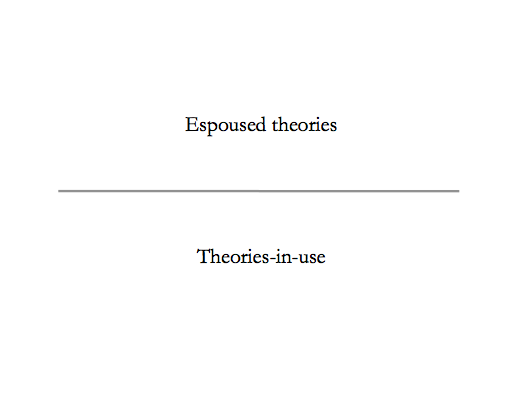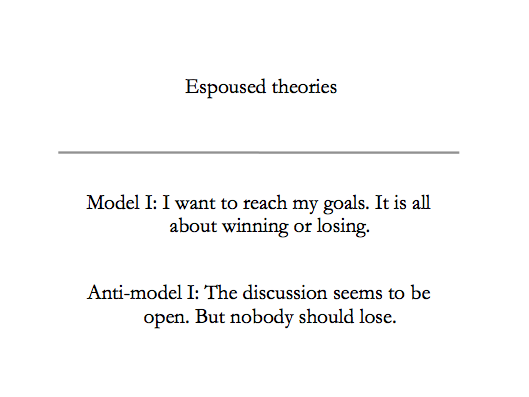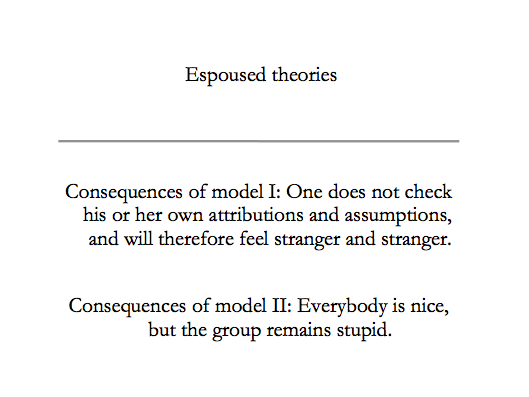The given situation
We were asked to conduct a team development training with team leaders of the customer service unit of a medium sized, highly efficient working enterprise. Our task was to help the team leaders to solve conflicts originating from some problematic events several months before.
The team leaders are experienced and skilled persons who have done their jobs in this company for at least three years. There are nearly no problems with their own teams, but within the group of team leaders itself. If there is a problem from outside the group such as a request to engage some of their more experienced service team members in projects of other units, the group members get together and try to solve the problem. That could mean to defend the status quo, too. But if there’s no request or any other problem from outside, the team leaders are hardly able to find any solution. Their meetings would lead to nearly no results, and the more serious issues would be postponed several times until somebody from the management board (“outside”) would insist to find a decision until a set deadline.
What is the problem?
Asked for their goals and expectations for the training some of the group members recounted their view on when and why the problems occurred and what should happen in the training. The picture as we saw it after the group members completed their stories:
The superior of the group of team leaders (member of the management board) was away for several months due to duties overseas. His representative (one of the group members) was to replace him temporarily. This was the official regulation. But the deputy was not able to fill the temporary “leadership gap” for three reasons: First, some of his team members did not accept him as their temporary supervisor. Second, the general manager tended to make use of the situation as he tried to convince the temporary manager to make more fundamental changes in a given period of time than the manager who was overseas would have accepted. Third, when the other members of the group learned about the changes intended by the general manager, they became passive and did not contribute to the changes. Most decisions had to wait until the manager would be back from overseas.
The theoretical background
None of the members of the group would say that he or she did not want to contribute to the changes nor that he or she did not accept the temporary leader of the group. This would have made the committing person vulnerable. Moreover, the person would have been charged for acting unethically. So, the members of the group would not tell the truth about their assumptions in order to protect themselves from harm and accusations. This way of inconsistent communication the researcher Chris Argyris called defensive routines. A person would communicate inconsistent messages (= not tell the truth) and act as if he or she is not doing so in order to protect him- or herself. To be effective, such actions need to be covered up in order to make the defensive actions indiscussable.
“These actions are organizational defensive routines. They overprotect individuals or groups and inhibit them from learning new actions. They are routines because they occur continually and are independent of individual actors’ personalities.” (Argyris 1993c, p. 20) Defensive routines “exist in the first place because human beings learn early in life to deal with embarrassment or threat” (Argyris 1993c, p. 20).
According to Argyris, there are two types of theories that control the actions of an individual. Asked directly, a person would tell about his or her conscious theories of action, the so-called “espoused theories”, that contain, for instance, values or attitudes. These “espoused theories” differ systematically from the less conscious “theories-in-use”, that actually guide a person’s actions. Argyris (1993a, p. 186) says, that there’s a systematic difference between theories-in-use and the espoused theories. While the espoused theories differ from individual to individual and situation to situation, the theories-in-use are similar to each other and do not differ. There are, according to Argyris, just two models of theories-in-use in the world. So the conscious theories of action differ from individual to individual, but there are just two types of the unconscious theories-in-use.
Model I theory-in-use “has four governing values:
1. Achieve your intended purpose.
2. Maximize winning and minimize losing.
3. Suppress negative feelings.
4. Behave to what you consider rational.” (Argyris 1993c, p. 52)
There are three prevalent action strategies that arise from Model I:
1. Advocate and defend your own position.
2. Analyze the actions and (probable) thoughts of the others.
3. Find and attribute causes for every action, fact or question you want to understand.
These action strategies have to be performed in a way that would confirm the values of the theory-in-use. That means, the action strategies would be performed in order to achieve control and winning. This is what we call “strategic communication”.
Argyris (1993a, p. 187) says, that most human beings are driven by theories-in-use related to the model I. He predicts which action strategies will be used and which results will be achieved. These predictions have been tested in dozens of groups and with thousands of individuals and have not been falsified up to now. Most people prefer theories that do not fit in the model I, and if they are confronted with Argyris’ predictions, they would try to prove their invalidity. Some of these people then would present strategies, that look like the opposite of model I. Argyris called this model the anti-model I.
Anti-model I contains contrary attributions and values, but its purpose is to cover up the real thoughts and opinions of an acting person (Argyris 1993a, p. 190). By using the anti-model I, communication would be more open and one-sided control can be reduced, but the main purpose of the strategies emerging from anti-model I is still the self-defense of the person or group using the anti-model I.
Defensive routines should protect human beings from negative surprises, loss of face, and threat (Argyris 1993b, p. 132). Ensuring this, defensive routines also prevent individuals and groups from learning how to reduce the origins of threat and loss of face by circumventing the thematization of negative feelings. As the psychoanalyst Wilfred Bion once took it: The repression – or even worse: the denial – of negative feelings prevents human beings from learning from experience. So the purpose of the above described model I is self-protection, but this also means a reduction of the freedom of choice. According to Argyris (1993a, p. 189), nearly all people use variants of the model I type of theories-in-use, and just a few use anti-model I theories-in-use. While interacting in families, groups or organizations, defensive patterns emerge to prevent – for the moment the individual, later the group – the involved persons from threat and embarrassment.
Argyris (1993a, S. 220) describes, giving an example, how an actor (an organizational psychologist) analyses and later explains the actions of his clients with the help of presumptions that he did not test. The reason for not having tested the presumption was another not-tested presumption: The clients could be irritated by such questions. That means, the first layer of presumptions will be legitimated – and covered! – by a second layer of presumptions. There are knowledge gaps, and instead of filling them with information we tend to create new gaps to fill them.
If this process works, it would end up in group dynamics of winning and losing, of conformity within a group and polarization between groups. It would also lead to games of deception on the organizational level. The defensive routines on the organizational level additionally are “double faced” – the individual defensive actions are there to prevent the individual from dealing with embarrassment and threat, how much more difficult will it be to thematize defensive routines on the level of a group or even an organization?
What do we learn from this?
1. Human beings do not communicate non-strategic and open. Under normal circumstances they would not reveal their theories-in-use (assumptions about the others, values, attributions). This means, in negotiations each side would try to persuade the other side without changing the own position.
2. In multicultural settings the situation is even more difficult because of the additional assumptions about the other culture and the deep and mostly unconscious nonverbal irritations that originate from different habitus and value systems and social orders.
3. One chance to learn about negotiations is to develop better action strategies (the psychology of persuasion).
4. The other possibility to find better results in negotiations is to learn about the defensive mechanisms that prevent us from real learning – as long as I defend myself, I am not able to question my own assumptions about the others, their goals, my goals and so on.
5. The way to do this is to build a stable and bearing relationship to the persons whom I’m up to negotiate with.
Back to the team leaders: How to help the members of the group to solve their problems?
We agreed with the team members to work on the following issues:
1. They should learn something about the mechanisms that prevent them from task-oriented interaction and from finding solutions in their team meetings. To do so we asked them to participate in an exercise created by Chris Argyris (1993b) by which it is possible to identify the hidden thoughts and feelings in communication. This experience can bring teams to more mutual acceptance, openness and task-orientation.
2. As most of the team members outlined, in the discussion, the reasons for the current problems, the team culture suffered from a lack of mutual understanding and feedback during the last months. We conducted several exercises with figures that allowed the participants to give each other feedback and to express critical opinions and wishes as well.
3. It was necessary to rebuild good relationships within the team, and the team needed some methods for this. What helped here, was the method “reflecting team” and Ed Schein’s “campfire exercise”.
At last we want to point out that good communication is an ethical issue, too. As we learned from Chris Argyris, even everyday interaction under normal circumstances is “strategic” and defensive. It takes a long time and a strong willingness to reflect and to approve one’s own communication skills, not to mention the efforts to be taken in groups or organizations.
Regarding negotiations, you are to choose between two completely different sides and communication styles. You can use the best strategies you can find in order to win. Then you will care about how to start the conversation, which sequence would be best for the arguments and how to anticipate possible objections. But you can also try to establish equality and negotiate on the foundation of a trusting relationship.
Literature:
Argyris, Chris (1993a): Defensive Routinen. In: Gerhard Fatzer (Hg.): Organisationsentwicklung für die Zukunft. Ein Handbuch. Köln: Ed. Humanistische Psychologie, S. 179–226.
Argyris, Chris (1993b): Eingeübte Inkompetenz – ein Führungsdilemma. In: Gerhard Fatzer (Hg.): Organisationsentwicklung für die Zukunft. Ein Handbuch. Köln: Ed. Humanistische Psychologie, S. 129–144.
Argyris, Chris (1993c): Knowledge for action. A guide to overcoming barriers to organizational change. San Francisco, Calif: Jossey-Bass Publishers.



